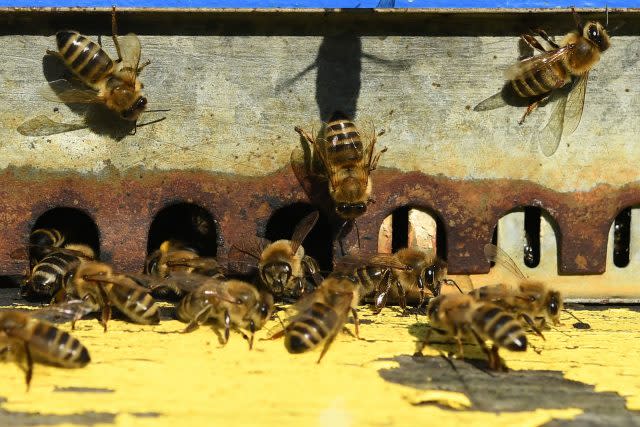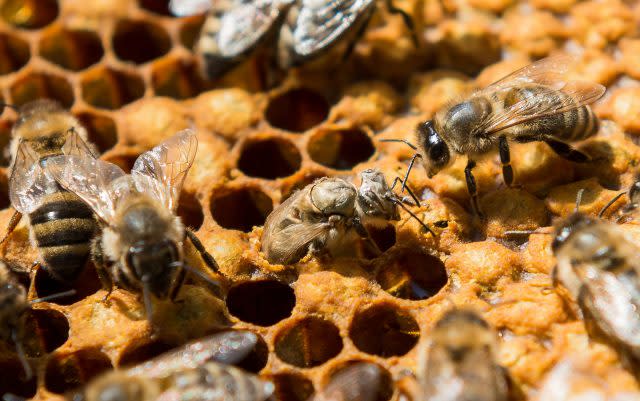Three-quarters of world's honey contains pesticides, study finds

Three-quarters of the honey produced around the world contains nerve agent pesticides that can harm bees and pose a potential health hazard to humans, a study has shown.
Scientists who tested 198 honey samples from every continent except Antarctica discovered that 75% were laced with at least one of the neonicotinoid chemicals.
More than two-fifths contained two or more varieties of the pesticides and 10% held residues from four or five.

Environmental campaigners responded by demanding a "complete and permanent" ban preventing any further use of neonicotinoids on farm crops in Europe.
Experts called the findings "alarming", "sobering" and a "serious environmental concern" while stressing that the pesticide residue levels found in honey generally fell well below the safe limits for human consumption.
However, one leading British scientist warned that it was impossible to predict what the long term effects of consuming honey containing tiny amounts of the chemicals might be.

Dave Goulson, Professor of Biology at the University of Sussex, said: "Beyond doubt ... anyone regularly eating honey is likely to be getting a small dose of mixed neurotoxins.
"In terms of acute toxicity, this certainly won't kill them and is unlikely to do measurable harm. What we don't know is whether there are long-term, chronic effects from life-time exposure to a cocktail of these and other pesticides in our honey and most other foods."
For practical reasons it was "impossible to do a proper experiment to test this", he added.
6 minute talk, if you want to find out what's wrong with our bees and how YOU can help: https://t.co/KsrXAGWDHs
-- Dave Goulson (@DaveGoulson) October 4, 2017
Neonicotinoids are neuro-active chemicals similar to nicotine that have proved to be highly effective at protecting crops from pests, especially aphids and root-eating grubs.
They can either be sprayed on leaves or coated on seeds, in which case they infiltrate every part of the growing plant.
Years of research have shown that under controlled conditions the chemicals are toxic to honey bees and bumblebees, causing brain damage that can affect learning and memory and impair their ability to forage for nectar and pollen.
(function(i,s,o,g,r,a,m){i['GoogleAnalyticsObject']=r;i[r]=i[r]function(){ (i[r].q=i[r].q[]).push(arguments)},i[r].l=1*new Date();a=s.createElement(o), m=s.getElementsByTagName(o)[0];a.async=1;a.src=g;m.parentNode.insertBefore(a,m) })(window,document,'script','//www.google-analytics.com/analytics.js','ga'); ga('create', 'UA-72310761-1', 'auto', {'name': 'pacontentapi'}); ga('pacontentapi.set', 'referrer', location.origin); ga('pacontentapi.set', 'dimension1', 'By PA Reporters'); ga('pacontentapi.set', 'dimension2', '2ff1cb6e-d55c-4684-bff8-e20337159abd'); ga('pacontentapi.set', 'dimension3', 'paservice:news,paservice:news:uk'); ga('pacontentapi.set', 'dimension6', 'story-enriched'); ga('pacontentapi.set', 'dimension7', 'composite'); ga('pacontentapi.set', 'dimension8', null); ga('pacontentapi.set', 'dimension9', null); ga('pacontentapi.send', 'pageview', { 'location': location.href, 'page': (location.pathname + location.search + location.hash), 'title': 'Three-quarters of world\u2019s honey contains pesticides, study finds'});


